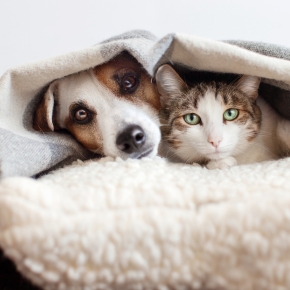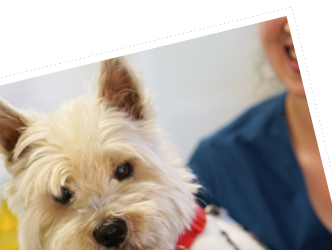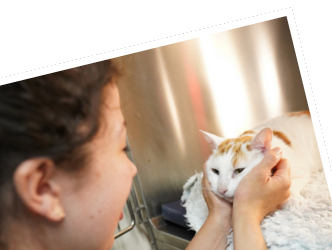
Noise Phobia in Dogs and Cats: How to Identify and Treat It
September 7, 2024
Noise phobia in dogs and cats is a common but distressing condition that can significantly impact their quality of life. This anxiety disorder causes pets to become extremely fearful of loud or sudden noises, leading to intense stress and behavioural changes. Our vets in Daventry have created this guide to help you understand noise phobia and its causes, symptoms, and treatment options to better support your furry friend.
With fireworks season just around the corner, contact the team at Daventry Veterinary Clinic to discuss which calming products for dogs or cats may help your furry friend cope.
Understanding noise phobia in dogs and cats
What is noise phobia?
Noise phobia is an intense fear or anxiety triggered by specific sounds. Unlike a simple reaction to loud noises, noise phobia involves a heightened and persistent fear that can lead to severe behavioural issues. Common noises that might trigger this phobia include thunderstorms, fireworks, sirens, or even household appliances.
How does noise phobia present in pets?
Our vets in Daventry share that pets with noise phobia may exhibit a range of distressing behaviours, including:
- Pacing and Restlessness: Pets may wander aimlessly or appear agitated.
- Hiding: They might seek refuge in enclosed spaces or under furniture.
- Vocalisation: Increased barking, whining, or meowing can be a sign of distress.
- Destructive Behaviour: Some pets may chew furniture or scratch walls.
- Shaking or Trembling: Physical signs of fear are common, particularly during loud noises.
These reactions can vary in severity depending on the individual pet and the intensity of the noise.
Contact us ahead of fireworks season to discuss calming aids for your pet.
Common causes of noise phobia in pets
Noise phobia can stem from a variety of causes:
- Lack of Early Socialisation: Pets who were not exposed to a range of sounds during their critical developmental period may be more susceptible to noise phobia.
- Traumatic Experiences: Past negative experiences related to loud noises, such as a frightening event during fireworks, can contribute to the development of this phobia.
- Genetics: Some pets may have a genetic predisposition to anxiety disorders, making them more prone to developing noise phobia.
- Environmental Factors: Changes in the environment, such as moving to a new home or experiencing sudden loud noises, can trigger or exacerbate the condition.
How to treat noise phobia in pets
Our team of experienced vets at Daventry Vets have dealt with many cases of noise phobia over the years. They advise that addressing it involves a combination of strategies to help reduce anxiety and manage symptoms:
- Create a Safe Space: Designate a quiet, secure area in your home where your pet can retreat during noisy events. Provide comfortable bedding and familiar items to help them feel safe.
- Desensitisation: Gradually expose your pet to recorded sounds of the noises that trigger their phobia at a low volume, increasing the volume over time. Pair these sessions with positive reinforcement to help them associate the sounds with rewards.
- Use Calming Products: Calming aids such as anxiety wraps, pheromone diffusers, or calming treats can help alleviate anxiety. Ask our vets in Daventry to discuss the most suitable options for your pet with you – get in touch.
- Professional Help: For severe cases, book an appointment at Daventry Vets. The vet will examine your pet for any underlying health conditions that could be contributing to their anxiety, as well as provide a tailored treatment plan, and medication if necessary. They may also discuss behavioural therapy and enlisting the help of a veterinary behaviourist.
- Maintain Routine: Keeping a consistent routine can provide stability and comfort for your pet, helping to reduce overall anxiety.
In conclusion, noise phobia can significantly impact a pet’s wellbeing, but with the right approach, it is manageable. By understanding the causes, recognising the symptoms, and implementing effective treatment strategies, you can help your pet feel more secure and less fearful. If you have concerns about your pet’s behaviour, don’t hesitate to contact our team in Daventry for advice.



